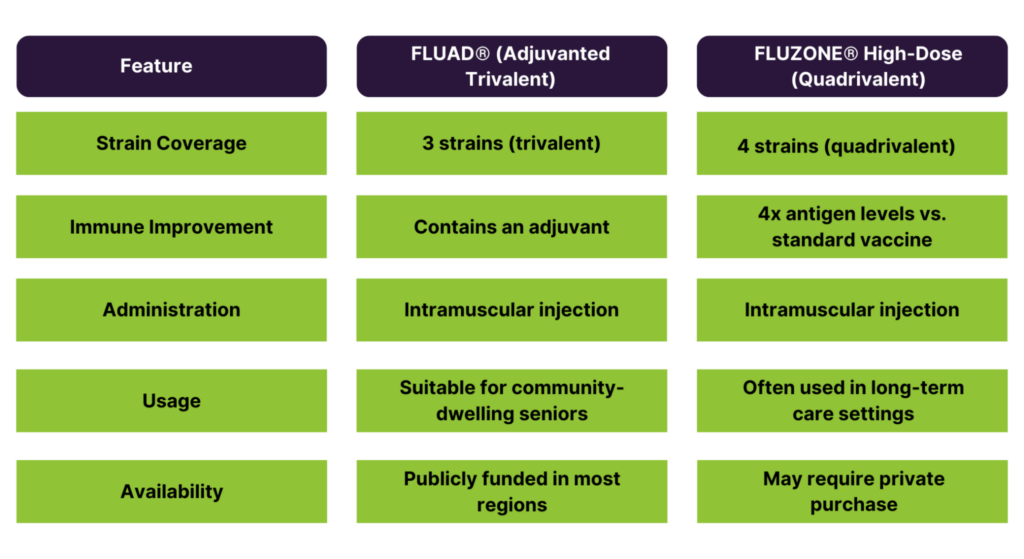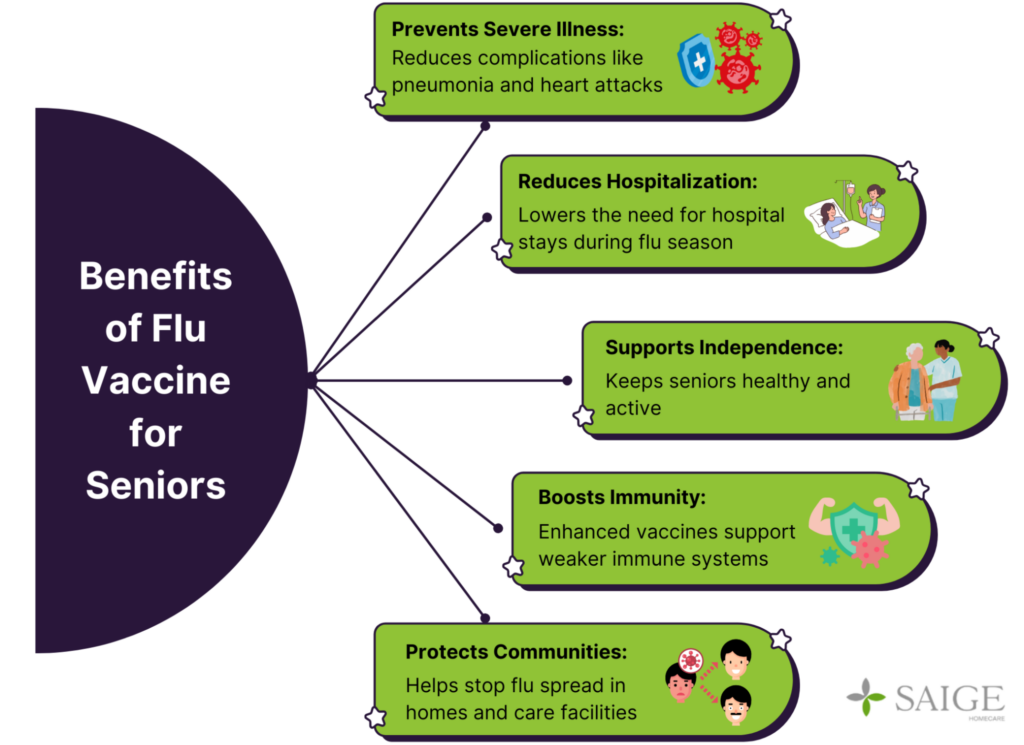Seniors account for 70-85% of flu-related deaths and 50-70% of hospitalizations annually, with weakened immunity making them more vulnerable to complications like pneumonia, heart attacks, and worsened chronic conditions. Annual flu vaccines help reduce severe illness, hospitalizations, and deaths. Since flu season peaks between November and April, early vaccination ensures the best protection. This blog explains the importance of flu vaccines for seniors, outlines vaccine options, and offers tips to stay protected. Stay ahead of the flu – read on to learn more.
Why Yearly Flu Vaccination is Essential for Seniors
Seniors are more prone to severe flu-related complications due to weakened immune systems, making the flu a serious health threat. Common complications include:
- Pneumonia: Flu infections can quickly develop into pneumonia, which is harder to fight with age.
- Worsening Chronic Conditions: Asthma, COPD, and heart conditions can become more severe after a flu infection.
- Increased Cardiovascular Risk: The flu increases the chance of heart attacks or strokes, particularly within the first week of infection.
Vaccination protects seniors and those around them, especially in multi-generational households and care settings. It reduces the risk of outbreaks, safeguarding other vulnerable individuals such as children and those with compromised immune systems.
Additionally, maintaining social connections is essential for seniors’ mental health. By getting vaccinated, seniors can safely engage in gatherings with family and friends, reducing their risk of severe illness. This allows them to enjoy important social interactions while contributing to a healthier community.
Flu Transmission
Flu spreads primarily through respiratory droplets when an infected person coughs, sneezes, or talks. It can also spread by touching contaminated surfaces or direct contact with someone carrying the virus.
These characteristics make flu outbreaks common in crowded environments, especially during the colder months when people spend more time indoors.
Prevention Measures to Limit Spread
- Frequent handwashing with soap and water or using Sanitizer.
- Wearing masks in public spaces during flu season.
- Avoid close contact with individuals displaying symptoms of the flu.
Why Yearly Vaccination is Necessary
Annual vaccination plays a crucial role in breaking the chain of transmission by reducing both individual infections and community spread.
- Mutating Flu Strains: To defend against the most prevalent strains of influenza viruses, vaccinations are updated yearly.
- Waning Immunity: Immunity from the previous year’s vaccine weakens over time, leaving seniors vulnerable if they skip a yearly shot.
- Optimal Protection: Getting vaccinated early in the season (ideally by October) ensures sufficient immunity by the time flu activity peaks during winter.
Together, these measures help ensure seniors stay protected throughout flu season while contributing to the broader goal of public health safety.
Seniors are advised to receive specific flu vaccines that provide enhanced protection. Options include high-dose and adjuvanted flu vaccines, which are designed to boost the immune response in older adults. These vaccines are essential for optimal flu protection.
Flu Vaccines for Seniors
Seniors benefit most from enhanced flu vaccines that strengthen the immune response.

Both vaccines are effective, with the choice depending on availability and individual health needs. Consulting a healthcare provider ensures the most suitable option is used.
How Effective are Flu Vaccines for Seniors?
Studies confirm that high-dose and adjuvanted vaccines significantly reduce severe outcomes among older adults.
- Reduced Hospitalization Risk: Enhanced vaccines lower the chance of flu-related hospitalization by 22-43% compared to standard vaccines
Lower Severity: Even if a vaccinated senior catches the flu, symptoms tend to be less severe, allowing for quicker recovery.
Annual Impact: Regular research shows these vaccines reduce mortality and keep seniors healthier throughout flu season

How to get Vaccinated
Timing Matters: Flu vaccines are generally available from October to April, and early vaccination (by the end of October) offers the best protection. It takes around two weeks for the vaccine to develop full immunity.
Where to Get Vaccinated:
You can receive the vaccine at various locations, including pharmacies, public health clinics, and primary care providers. Many places offer convenient access to vaccinations, and in Calgary, seniors can visit local pharmacies and public health clinics.
Additionally, many regions, provide online booking systems or telephone appointments to make the process easier. It’s advisable to book your appointment online or call Health Link at 811. If needed, plan transportation in advance to ensure you don’t miss your appointment.
Addressing Barriers and Vaccine Accessibility
Seniors may face barriers to getting vaccinated, such as transportation issues and costs. Some community organizations like in Calgary may provide resources to help seniors with transportation to vaccination sites or host local vaccination events, ensuring everyone has access to the flu shot. To improve access:
- Use Mobile Clinics: Look for mobile vaccination units in your neighborhood.
- Check Insurance Coverage: Many plans cover the flu vaccine. Community health clinics may offer free or low-cost options for those without insurance.
- Tap into Community Resources: Local organizations might help with transportation or host vaccination events.
How High-Dose Vaccines Boost Immunity in Seniors
High-dose flu vaccines are designed for seniors and contain more antigens to strengthen the immune response. This increased dosage helps provide better protection against the flu, reducing the risk of serious complications during the flu season.
Monitoring for Side Effects After Vaccination
Most people experience only mild side effects after receiving the flu shot, but it’s important to know what to expect and how to manage any reactions. In rare cases, more serious side effects may occur, requiring prompt attention. Here’s what to look out for:
Common Flu Shot Symptoms
Mild, temporary side effects are a normal response to the vaccine:
- Soreness, redness, or swelling at the injection site
- Fatigue or mild fever
- Headache, muscle, or joint aches
These symptoms typically resolve within 1–2 days. Applying a cold compress to the injection site or taking a pain reliever can help manage discomfort.
Rare but Serious Reactions
While extremely uncommon, some reactions require monitoring:
- Guillain-Barré Syndrome (GBS): A rare neurological condition causing muscle weakness or paralysis, occurring in about 1 in a million cases.
- Severe Allergic Reactions: Symptoms include difficulty breathing, swelling, or hives. Individuals should remain at the clinic for 15 minutes post-vaccination to monitor for immediate reactions. Clinics are equipped with epinephrine to treat such cases if needed.
Staying informed about possible side effects ensures safe vaccination and quick response if needed.
Who Should Not Get the Flu Vaccine
Although the flu vaccine is safe for most people, some individuals should avoid it or seek medical advice first.
Exclusions:
- Individuals with severe allergies to vaccine components
- People with a history of GBS after flu vaccination should consult a healthcare provider before receiving it again.
- Seniors who are currently experiencing moderate to severe illness should wait until they have recovered before getting vaccinated.
Staying Healthy With Flu Vaccine for Seniors
In winter months which bring increased flu activity, getting vaccinated is especially important for seniors to stay healthy and avoid severe illness, hospital stays, and worsening health conditions. Enhanced vaccines give older adults the extra protection they need as their immune systems weaken with age.
Early vaccination ensures the flu shot has time to work before the virus spreads. Staying up to date with other vaccines, like pneumonia or COVID-19, offers even more protection. In shared spaces, such as care homes or family households, flu vaccination also helps stop the spread to others.
By planning ahead, seniors can stay healthier, independent, and better protected throughout flu season.
Related Reads
Crеating a Dеmеntia-Friеndly Homе Environmеnt: Tips for Calgary Familiеs
The Benefits Of Aging In Place
FAQ’s on Flu Vaccines for Seniors
Is there a difference between a regular flu shot and a senior flu shot?
Yes. Senior flu shots like high-dose or adjuvanted vaccines, boost the immune response, offering better protection for adults aged 65 and older. These vaccines are recommended for seniors due to their reduced immune function.
What to avoid after a flu shot?
After a flu shot, avoid strenuous activity for 24-48 hours to allow your body to recover, especially if you experience soreness or fatigue. Also, limit alcohol consumption as it can weaken your immune response and worsen side effects like dehydration or headache.
Who is eligible for the Ontario flu shot?
Everyone aged 6 months and older living, working, or studying in Ontario is eligible. It’s highly recommended for seniors, individuals with chronic conditions, pregnant people, and healthcare workers to prevent severe illness and reduce transmission risks.
How long does protection from the influenza vaccine last?
Immunity lasts about six months, making annual vaccination necessary due to waning immunity and evolving flu strains.
What are flu symptoms in the elderly?
Elderly individuals with the flu may experience fever, chills, dry cough, body aches, headaches, and fatigue. Less common symptoms include sore throat, sneezing, stuffy nose, and stomach issues. Early recognition of these symptoms is important to prevent complications.
Can Flu Vaccines Be Given with Other Vaccines?
Seniors can get the flu vaccine along with other vaccines, like COVID-19 and pneumonia, without any loss of effectiveness. Getting all vaccines in one visit makes it easier for seniors to keep up with their immunizations and keeps their routines uninterrupted.


